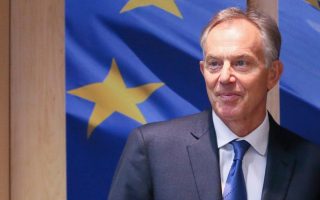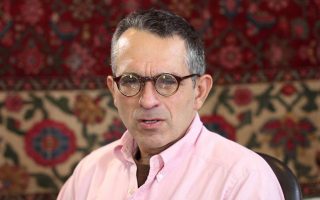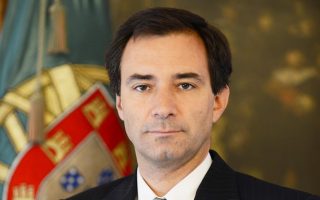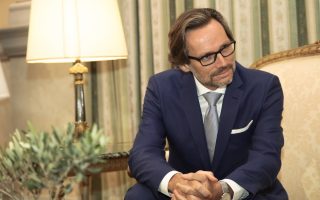Greece needs sustainable development – and debt relief

“Sustainable development means an economy that is prosperous, fair and environmentally sustainable. That is the perfect framework for Greece’s economic recovery.” That is how celebrated American economist and Columbia University professor Jeffrey Sachs explains the significance of the official launch of SDSN Greece, the Greek Sustainable Development Solutions Network – the 22nd national or regional network to join the global United Nations Sustainable Development Solutions Network (UNSDSN).
Sachs is director of UNSDSN, which was founded in September 2015 after the adoption of Agenda 2030 and the 17 Sustainable Development Goals (SDGs) by the UN’s 193 member-states. SDSN Greece will be officially launched at a conference in Athens this week where the US academic will be the keynote speaker.
“Greece needs to restore prosperity by building up a new innovation sector,” Sachs argues. “It needs fairness, to cut corruption, empower women – too few are in Parliament – and help the poor. And it needs a green economy, with less pollution, protection for the Mediterranean, and sales of renewable energy – wind and solar – to the rest of Europe. The Greek SDSN will aim to support Greece in these huge – and exciting – challenges during the period to 2030.”
SDGs
The 17 SDGs of Agenda 2030 have replaced the Millennium Development Goals (MDGs) set by the United Nations in 2001 and whose targeted completion date was 2015. Among the MDGs were the eradication of extreme poverty, the reduction of child mortality, the fight against epidemics such as AIDS etc. What was the logic of the transition from the MDGs to the SDGs? How effectively has UNSDSN been able to coordinate national and regional networks in the pursuit of sustainable development policies?
“The UN moved from fighting extreme poverty – the MDGs – to promoting sustainable development – the SDGs,” Sachs says. “The MDG aim to end poverty is still part of the program, but now there is more emphasis on innovation, social justice, decent work and environmental sustainability as well. It’s an agenda for every country, not just the poor ones. Clearly, Greece needs to promote sustainable development. So too does my country, the United States, which is terribly unjust to the poor and also highly and dangerously polluting. The promotion of peace is another aim of the SDGs. That’s another area where the United States lags badly behind the goals.”
As the long-time adviser to successive UN secretaries-general explains: “The SDSN is a global network of universities and think tanks, under the auspices of the UN secretary-general, aiming to support the SDGs. It’s not easy. Many governments are corrupt, uncaring, violent and generally irresponsible. Therefore, civil society must play an ever-larger role. Yet there is also a lot of energy and interest, so it’s a mixed picture.”
Environmental economists have long been voicing objections about the tools conventionally used to measure well-being. Leaders in the field, including Cambridge economist Partha Dasgupta, argue that GDP should be replaced as a metric by a more comprehensive concept of wealth, which will also take into account the state of an economy’s natural resources. How optimistic is Professor Sachs that in the near future measurements of economic well-being will move beyond GDP in this direction?
“There is a lot of interest among analysts, scholars, investors, psychologists and social activists in broader metrics – for example the new SDG Index that the SDSN publishes each year (Greece currently ranks 38 out of 157 countries in progress towards the SDGs). I also co-edit the annual World Happiness Report, which promotes the direct measurement of subjective well-being as another metric (Greece currently ranks 87th out of 155 countries).”
However, the American economist admits that “there is a lot of delay in adopting these broader measures. Donald Trump is trying to undo climate science in the United States since he is in bed with the oil industry. This will hold back efforts by the US to make better metrics.”
How much damage is the Trump administration doing to the fight against catastrophic climate change? Is he more worried about its international stance (pulling out of the Paris Agreement) or its domestic policies (repealing restrictions on emissions and oil and gas exploration imposed by Obama, aggressively pushing new coal mining projects on public lands etc)?
“It’s not just Trump,” he says. “It’s Big Oil. Look at Texas. Huge oil industry, climate deniers as leading politicians, anti-Paris Agreement, anti-federal government, until they need a bailout from the Houston flooding. Now they’re asking for more than $125 billion dollars of federal money, despite having done little to anticipate the risks of flooding, or to head them off. A bunch of hypocrites. But they have a lot of power, to be sure.”
How concerned is Sachs about American democracy, as President Trump relies increasingly on his angry base at the same time as showing ever-diminishing respect for the rule of law?
“Trump has the support of around one-third of the country. He is disliked by around 60 percent of the country. He is a divider. It will get worse. Trump combines awful politics with personal psychological instability. He is a narcissist and sociopath, in that he cares little about the well-being of others. Certainly the US should never have put a man like this anywhere near military power.”
Social democracy
Sachs has been both a defender of globalization and a fierce critic of the injustices it leads to. We asked him how the management of globalization should evolve so that it can continue to reduce the inequality between nations, but at the same time arrest the growing inequality within certain societies that it has produced?
The answer, according to the Columbia professor, is social democracy. “It has proven to provide the best balance of prosperity, justice and sustainability. It brings a high level of prosperity to its people. It promotes honest government, strong trade unions and fairness for workers. I believe that globalization can be made responsible and accountable by a 21st century social democracy. That’s what I try to promote in my own country, where we face powerful forces of greed and militarism.”
Sachs has been intimately involved in the Greek crisis, as an adviser to George Papandreou and – more controversially – Yanis Varoufakis. How does he see the country’s prospects two years after the turbulent summer of 2015?
“Greece desperately needs a fresh start by finally having its long-term debt burden reduced. Germany has been an obstacle to this goal.
“My hope is that after the German elections, and with the support of French President Emmanuel Macron, perhaps Europe will finally wake up and offer Greece a way out of this disaster. I’ve tried to help for many years, but Germany has been far too stubborn.”





